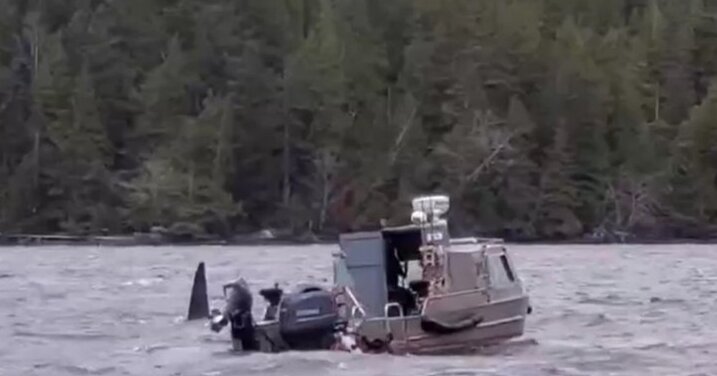Scuba Diver Is Fined After Getting Too Close to Killer Whales

A scuba diver was fined 12,000 Canadian dollars for swimming too close to a group of killer whales, a threatened species, in British Columbia two years ago, the authorities said this week.
The diver, Thomas Gould, “knowingly interacted” with a pod of seven Northern Resident killer whales near Prince Rupert Harbor in April 2020, Fisheries and Oceans Canada said in a statement on Monday.
Last month, Judge Jeffrey Campbell of the Prince Rupert Provincial Court ordered Mr. Gould to pay the fine, which is about $9,200 in U.S. dollars, for violating Canada’s Fisheries Act.
The fine stemmed from an incident that took place on April 25, 2020, when Mr. Gould, the owner of the commercial dive vessel “Ice Cube,” approached the pod, the authorities said.
Fishery investigators learned that his vessel “attempted to motor ahead of the whale pod several times,” in a practice they described as “leapfrogging.”
Security cameras in the area captured the activity, and witness reports to a fisheries hotline led investigators to Mr. Gould.
“It was also determined that Mr. Gould, in full dive gear, entered the water two different times in close proximity to the whales,” the department said. Mr. Gould could not immediately be reached for comment. It was not clear if he had a lawyer.
Canada’s Marine Mammal Regulations provide minimum approach distances for whales, dolphins and porpoises.
All vessels must keep a distance of about 650 feet from killer whales in British Columbia and the Pacific Ocean, and they must maintain a distance of about 1,300 feet from killer whales in coastal waters off Vancouver Island from June 1 to May 31. It is illegal to swim, dive or interact with marine mammals, according to the Marine Mammal Regulations.
Northern Resident killer whales are orcas that live in the waters off the west coast of Canada. The pod of orcas that Mr. Gould was fined for approaching has returned to the Prince Rupert area every spring for more than a decade, Fisheries and Oceans Canada said. Signs are posted in the area advising boaters to steer clear of the mammals.
Northern Resident killer whales are listed as threatened under Canada’s Species at Risk Actfor factors that include its small population size, low reproduction rate and human-related threats.
Dr. Frances Gulland, chair of the Marine Mammal Commission in the United States, said the whales, along with the Southern Resident killer whales in the waters off Washington State, “are still suffering from the same threats.”
She noted “declining salmon stocks, noise disturbances that interferes with their feeding and environmental pollutants” as additional endangering factors to people wanting to get too close to the mammals.
Worldwide, there are an estimated 50,000 killer whales, or orcas. But several populations have declined in recent decades, and some have become endangered, according to the National Oceanic and Atmospheric Administration.
Fisheries and Oceans Canada noted that there was scientific evidence that when vessels get too close to killer whales, they can “disrupt” their normal behavior patterns.
“Approaching marine mammals too quickly, coming too close or making too much noise can disturb, stress or even harm then,” the department said in its statement. “If you see tail, fin or spray, stay far enough away.”